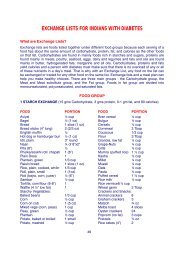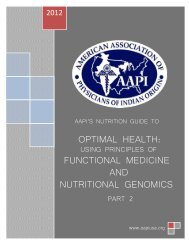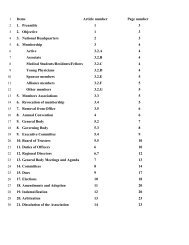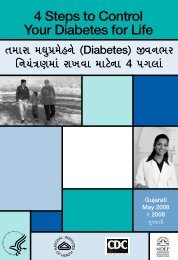functional medicine and nutritional genomics - American Association ...
functional medicine and nutritional genomics - American Association ...
functional medicine and nutritional genomics - American Association ...
Create successful ePaper yourself
Turn your PDF publications into a flip-book with our unique Google optimized e-Paper software.
AAPI’S NUTRITION GUIDE TO OPTIMAL HEALTH: USING PRINCIPLES OF FUNCTIONAL MEDICINE AND NUTRITIONAL GENOMICS<br />
indicates that up to 10 percent of the AI for ALA<br />
can be in the form of DHA <strong>and</strong> EPA combined.<br />
For example, a child’s daily need for DHA <strong>and</strong><br />
EPA are 70mg for a 1 – 3 year old, 90mg for<br />
a 4 – 8 year old, <strong>and</strong> 120mg for a 9 – 13<br />
year old child (26).<br />
The National Institutes of Health (NIH)<br />
recommends we consume even higher levels of<br />
DHA <strong>and</strong> EPA. According to the NIH, 30 percent<br />
of our daily calories should be DHA <strong>and</strong> EPA<br />
combined. The chart below lists the amount a<br />
child should consume according to these st<strong>and</strong>ards<br />
(44).<br />
ADEQUATE INTAKE OF DHA AND EPA<br />
(Based on 30 Percent of Calories)<br />
Age DHA <strong>and</strong> EPA combined (mg/day)<br />
1 – 3 years 390<br />
4 – 6 years 540<br />
7 years <strong>and</strong> older 650<br />
Source: National Institutes of Health (NIH)<br />
Since deficiencies of DHA <strong>and</strong> EPA are linked to<br />
autism, dyslexia, attention deficient hyperactivity<br />
disorder, dyspraxia, depression, <strong>and</strong> anxiety, it is<br />
suggested that the NIH’s recommendations be<br />
used to determine a child’s DHA <strong>and</strong> EPA needs.<br />
Omega-3 Fatty Acid Supplements for Children<br />
with Autism - Children with autism <strong>and</strong> other<br />
developmental disorders often have feeding<br />
problems, eat a limited variety of foods, <strong>and</strong><br />
refuse fish, so it may not be possible to get<br />
adequate amounts of omega-3 fatty acids into the<br />
diet of a child with autism. In this case, the<br />
child will need to take an omega-3 fatty acid<br />
supplement. A Registered Dietitian can assist<br />
parents on selecting a high quality child-friendly<br />
fish oil supplement.<br />
Examples of fish oil supplements are listed below:<br />
Fish Oil Supplement Amount DHA <strong>and</strong> EPA<br />
Cod liver oil (liquid) 1 teaspoon 1,035 mg<br />
Coromega― (original) 1 packet 580 mg<br />
DHA Junior<br />
(Nordic Naturals) 1 soft gel 52 mg<br />
Omega-3 Gummies 1 gummy 68 mg<br />
121<br />
(Nordic Naturals)<br />
Vitamin <strong>and</strong> Minerals also known as micronutrients<br />
are needed for normal growth, function, <strong>and</strong><br />
health. Our bodies do not make most<br />
micronutrients, so we have to get them from the<br />
food we eat or in some cases, from dietary<br />
supplements. Vitamins <strong>and</strong> minerals are critical for<br />
brain development <strong>and</strong> function; regulating cell <strong>and</strong><br />
tissue growth, processing <strong>and</strong> eliminating toxins<br />
from the body; maintaining a healthy<br />
gastrointestinal tract; supporting immune system<br />
function; converting protein, carbohydrate, <strong>and</strong> fat<br />
into energy; providing structure to bones; formation<br />
of blood; <strong>and</strong> numerous other body functions.<br />
Some vitamins also function as hormones,<br />
antioxidants, coenzymes, <strong>and</strong> precursors for<br />
enzymes. Each vitamin <strong>and</strong> mineral is unique <strong>and</strong><br />
has its own specific role in the body (45). The<br />
most important vitamins <strong>and</strong> minerals for brain<br />
function include:<br />
� Calcium is required for the transmission of<br />
nerve impulses in the brain <strong>and</strong> aids in<br />
the release of neurotransmitters from<br />
neurons.<br />
� Iron transports oxygen to the brain <strong>and</strong> is<br />
also needed to produce the<br />
neurotransmitter dopamine. A deficiency of<br />
iron can cause fatigue, impaired mental<br />
function, poor work <strong>and</strong> school<br />
performance, <strong>and</strong> decreased attention span,<br />
learning, <strong>and</strong> memory.<br />
� Vitamin B1 (thiamin) aids normal<br />
functioning of the nervous system <strong>and</strong> a<br />
deficiency can result in mental confusion<br />
<strong>and</strong> complications involving the brain.<br />
� Vitamin B2 (riboflavin) is required by the<br />
body for the production of energy, to form<br />
glutathione, <strong>and</strong> to convert vitamin B6 to<br />
pyridoxal 5-phosphate.<br />
� Vitamin B6 (pyridoxine) helps the body<br />
break down protein, <strong>and</strong> helps maintain<br />
the health of red blood cells, the nervous<br />
system, <strong>and</strong> parts of the immune system.<br />
Vitamin B6 is also involved in the<br />
production of the neurotransmitters<br />
serotonin <strong>and</strong> dopamine. A deficiency of<br />
2012

















